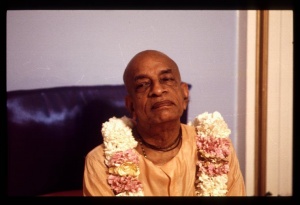CC Madhya 8.146: Difference between revisions
m (1 revision(s)) |
No edit summary |
||
| Line 1: | Line 1: | ||
{{ | [[Category:Sri Caitanya-caritamrta - Madhya-lila Chapter 08|C146]] | ||
<div style="float:left">'''[[Sri Caitanya-caritamrta|Śrī Caitanya-caritāmṛta]] - [[CC Madhya|Madhya-līlā]] - [[CC Madhya 8|Chapter 8: Talks Between Śrī Caitanya Mahāprabhu and Rāmānanda Rāya]]'''</div> | |||
<div style="float:right">[[File:Go-previous.png|link=CC Madhya 8.145|Madhya-līlā 8.145]] '''[[CC Madhya 8.145|Madhya-līlā 8.145]] - [[CC Madhya 8.147|Madhya-līlā 8.147]]''' [[File:Go-next.png|link=CC Madhya 8.147|Madhya-līlā 8.147]]</div> | |||
{{CompareVersions|CC|Madhya 8.146|CC 1975|CC 1996}} | |||
{{RandomImage}} | |||
==== TEXT 146 ==== | ==== TEXT 146 ==== | ||
<div | <div class="verse"> | ||
dvijātmajā me yuvayor didṛkṣuṇā | :dvijātmajā me yuvayor didṛkṣuṇā | ||
mayopanītā bhuvi dharma-guptaye | :mayopanītā bhuvi dharma-guptaye | ||
kalāvatīrṇāv avaner bharāsurān | :kalāvatīrṇāv avaner bharāsurān | ||
hatveha bhūyas tvarayetam anti me | :hatveha bhūyas tvarayetam anti me | ||
</div> | </div> | ||
| Line 14: | Line 18: | ||
==== SYNONYMS ==== | ==== SYNONYMS ==== | ||
<div | <div class="synonyms"> | ||
dvija-ātma- | ''dvija-ātma-jāḥ''—the sons of the ''brāhmaṇa''; ''me''—by Me; ''yuvayoḥ''—of both of you; ''didṛkṣuṇā''—desiring the sight; ''mayā''—by Me; ''upanītāḥ''—brought; ''bhuvi''—in the world; ''dharma-guptaye''—for the protection of religious principles; ''kalā''—with all potencies; ''avatīrṇau''—who descended; ''avaneḥ''—of the world; ''bhara-asurān''—the heavy load of demons; ''hatvā''—having killed; ''iha''—here in the spiritual world; ''bhūyaḥ''—again; ''tvarayā''—very soon; ''itam''—please come back; ''anti''—near; me—Me. | ||
</div> | </div> | ||
| Line 21: | Line 25: | ||
==== TRANSLATION ==== | ==== TRANSLATION ==== | ||
<div | <div class="translation"> | ||
“[Addressing Kṛṣṇa and Arjuna, Lord Mahā-Viṣṇu (the Mahāpuruṣa) said:] ‘I wanted to see both of you, and therefore I have brought the sons of the brāhmaṇa here. Both of you have appeared in the material world to reestablish religious principles, and you have both appeared here with all your potencies. After killing all the demons, please quickly return to the spiritual world.’ | “[Addressing Kṛṣṇa and Arjuna, Lord Mahā-Viṣṇu (the Mahāpuruṣa) said:] ‘I wanted to see both of you, and therefore I have brought the sons of the brāhmaṇa here. Both of you have appeared in the material world to reestablish religious principles, and you have both appeared here with all your potencies. After killing all the demons, please quickly return to the spiritual world.’ | ||
</div> | </div> | ||
| Line 28: | Line 32: | ||
==== PURPORT ==== | ==== PURPORT ==== | ||
<div | <div class="purport"> | ||
This is a quotation from Śrīmad-Bhāgavatam ([[SB 10.89.58]]) concerning Kṛṣṇa’s endeavor to take Arjuna beyond the material universe when Arjuna was searching for the sons of a brāhmaṇa. | This is a quotation from [[Srimad-Bhagavatam|''Śrīmad-Bhāgavatam'']] ([[SB 10.89.58]]) concerning Kṛṣṇa’s endeavor to take Arjuna beyond the material universe when Arjuna was searching for the sons of a ''brāhmaṇa''. | ||
Lord Mahā-Viṣṇu, who is situated beyond this material world, was also attracted by the bodily features of Kṛṣṇa. Mahā-Viṣṇu had actually stolen the sons of the brāhmaṇa in Dvārakā so that Kṛṣṇa and Arjuna would come visit Him. This verse is quoted to show that Kṛṣṇa is so attractive that He attracts Mahā-Viṣṇu. | Lord Mahā-Viṣṇu, who is situated beyond this material world, was also attracted by the bodily features of Kṛṣṇa. Mahā-Viṣṇu had actually stolen the sons of the ''brāhmaṇa'' in Dvārakā so that Kṛṣṇa and Arjuna would come visit Him. This verse is quoted to show that Kṛṣṇa is so attractive that He attracts Mahā-Viṣṇu. | ||
</div> | </div> | ||
__NOTOC__ | |||
<div style="float:right; clear:both;">[[File:Go-previous.png|link=CC Madhya 8.145|Madhya-līlā 8.145]] '''[[CC Madhya 8.145|Madhya-līlā 8.145]] - [[CC Madhya 8.147|Madhya-līlā 8.147]]''' [[File:Go-next.png|link=CC Madhya 8.147|Madhya-līlā 8.147]]</div> | |||
__NOTOC__ | |||
__NOEDITSECTION__ | |||
Revision as of 08:11, 11 August 2021

A.C. Bhaktivedanta Swami Prabhupada
TEXT 146
- dvijātmajā me yuvayor didṛkṣuṇā
- mayopanītā bhuvi dharma-guptaye
- kalāvatīrṇāv avaner bharāsurān
- hatveha bhūyas tvarayetam anti me
SYNONYMS
dvija-ātma-jāḥ—the sons of the brāhmaṇa; me—by Me; yuvayoḥ—of both of you; didṛkṣuṇā—desiring the sight; mayā—by Me; upanītāḥ—brought; bhuvi—in the world; dharma-guptaye—for the protection of religious principles; kalā—with all potencies; avatīrṇau—who descended; avaneḥ—of the world; bhara-asurān—the heavy load of demons; hatvā—having killed; iha—here in the spiritual world; bhūyaḥ—again; tvarayā—very soon; itam—please come back; anti—near; me—Me.
TRANSLATION
“[Addressing Kṛṣṇa and Arjuna, Lord Mahā-Viṣṇu (the Mahāpuruṣa) said:] ‘I wanted to see both of you, and therefore I have brought the sons of the brāhmaṇa here. Both of you have appeared in the material world to reestablish religious principles, and you have both appeared here with all your potencies. After killing all the demons, please quickly return to the spiritual world.’
PURPORT
This is a quotation from Śrīmad-Bhāgavatam (SB 10.89.58) concerning Kṛṣṇa’s endeavor to take Arjuna beyond the material universe when Arjuna was searching for the sons of a brāhmaṇa.
Lord Mahā-Viṣṇu, who is situated beyond this material world, was also attracted by the bodily features of Kṛṣṇa. Mahā-Viṣṇu had actually stolen the sons of the brāhmaṇa in Dvārakā so that Kṛṣṇa and Arjuna would come visit Him. This verse is quoted to show that Kṛṣṇa is so attractive that He attracts Mahā-Viṣṇu.